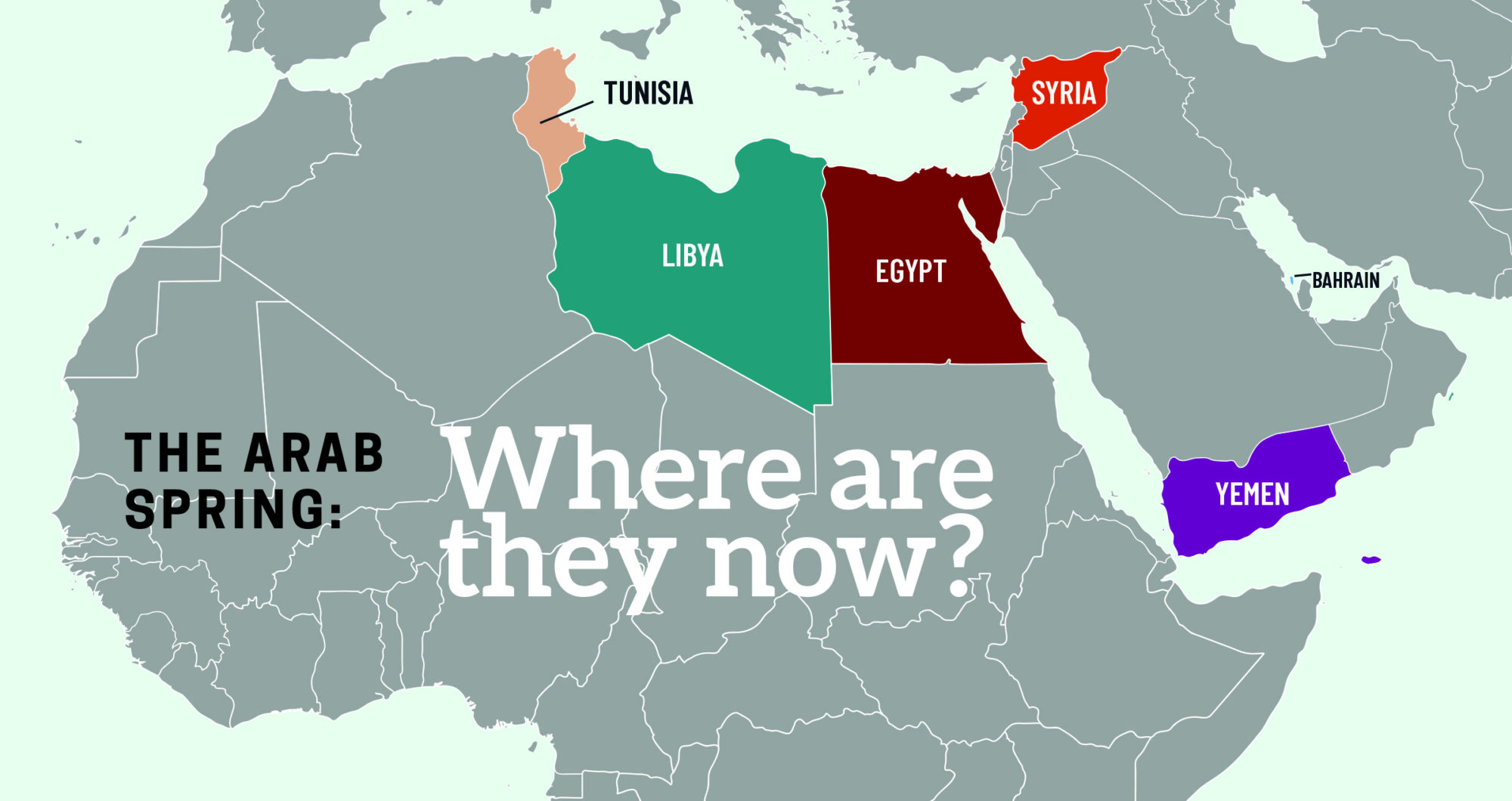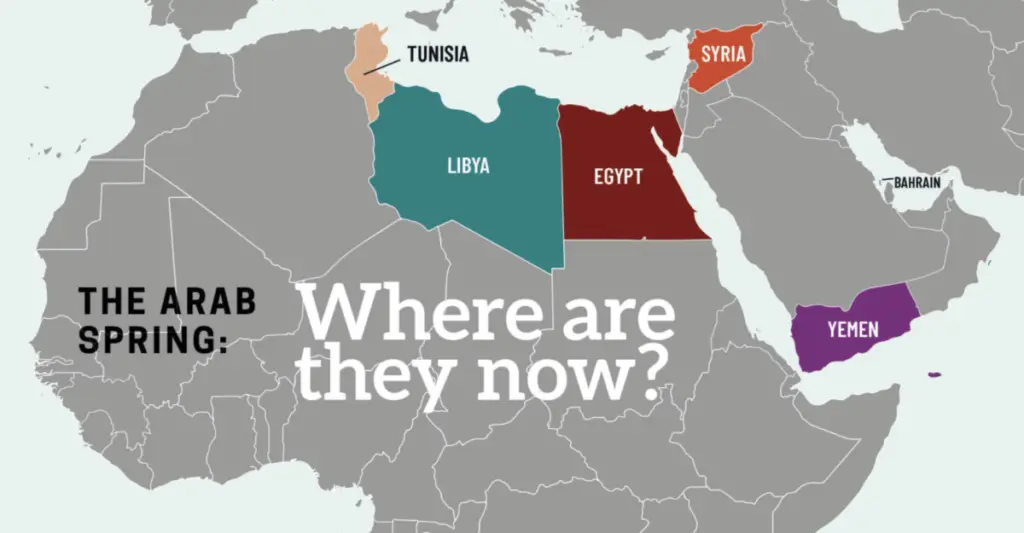Drew Carson* has a hard time believing it’s been 10 years since the Arab Spring started on the western side of Northern Africa and swept all the way across the Middle East.
Part of that, he said, is because not much has changed since those fiery first few months of the region’s thawra, or “revolution” in Arabic—it feels a bit like the picture stood still. When Tunisian citizen Mohamed Bouazizi lit himself on fire in December 2010 in protest of high unemployment, government corruption and a lack of opportunities, he started a movement, and the unlikely happened—the government fell. The idea spread to Libya, Egypt, Yemen, Syria and Bahrain. But then things stopped.

If it was a “spring,” Carson said, it didn’t feel much like it. At the beginning, the swell of people’s protests unseated rulers in some countries and started civil wars in others, but the fresh future the people had looked for never came.
Instead, they settled into a new kind of suffering. Syria is still riddled with bullet holes and bombed-out buildings, its people huddled by the millions in nearby countries and scattered across Europe and the world. Lebanon, which took on a massive load of refugees, got another hit recently when a giant, deadly explosion in the capital city of Beirut left hundreds of thousands homeless.
And Yemen is still facing “one of the world’s worst disasters in all of history,” said Carson, a former longtime Christian leader in the area. The fight for control of the government there has caused a massive humanitarian crisis. UNICEF calls it a “living hell” for Yemeni children—hundreds of thousands are “acutely malnourished and fighting for their lives.”
And Tunisia, the country where it all began, has had more than 10 governments since the Arab Spring started.
“A Tunisian man came in the barbershop where I was getting my hair cut the other day and he just kept talking about the corruption back in his country, the fact that there’s no stability there,” said Carson, who now lives in the United States. “His opinion is like many others from that area—‘I don’t like the way the world is right now; I can’t trust it.’”
That sentiment seems frozen in time, the same as a decade ago, but Carson feels the passing of time in other ways. He feels it in the dozens of haircuts he’s logged at the Iraqi barbershop since he moved back to the U.S., and he sees it in the fact that his barber and the Tunisian man are in his city at all.
“We certainly have a larger Arab diaspora out there than there has been in their whole history,” he said. Carson also sees “remaking” in other areas, like the possibility of Syrian refugees encountering the gospel as they make their way into other countries (see related story), or new freedoms that have come in some ways because of the Arab Spring.
One of those has shown up in work like that of Andrew and Courtney Dobson*, Christian workers who before the Arab Spring had a hard time knowing how long they’d get to stay in the country where they lived. For years, others around them had been kicked out without warning.
But as the government changed in their country, changes in the law forced them to rethink their reason for being there. That spurred them to start a new kind of business—one that puts them in contact with a lot of local people who have never heard the gospel.
“It has given us access to hundreds and hundreds of people,” Andrew said. “We’ve found ways to be a lot more productive and have a lot more relationships than we did before.”
Courtney said it’s been a “big encouragement” to them and that they’ve also been able to have teams in areas they never have before as a result of the changes. As they’ve had more relationships, more people have been willing to read the Bible and engage with them than ever before. The Dobsons are praying that will turn into a “spring” of people finding new life in Christ, people who are now very aware that the revolution didn’t bring them the freedom they had hoped for.
“We’ve heard many people say, ‘We thought this was going to be better, but we are worse off than we were before,’” Courtney Dobson said. “They say things like, ‘Nothing really changed, nothing got better, all those people died for nothing.’ It’s hard to hear and see them feel that kind of hopelessness.”
Carson agreed, saying that when he looks at the Middle East, his heart breaks.
I do know the Lord will bring peace one day, and my prayer for all of them is that they would find the hope and healing that is found in Christ.
“I love these people. I certainly want them all to come to Christ,” he said. “I see them broken. I see them stretched on every side. I see families who have lost and lost and lost and lost and spiraled down.”
He said it’s hard to know exactly what the outcome will be of the revolution that escalated quickly, then—rather than bringing freedom—became a slow burn across the region.
“In the midst of the Arab Spring, there’s been a lot of chaos, but there’s a lot of remaking that comes out of that,” Carson said.
It’s opened access to some places and people but closed some others, he said. And it’s brought freedom to some to make a decision for Christ who might not have had that freedom before.
“I have no wish for them to all be living in famine and war and terror and all those kinds of things,” Carson said. “The price people have paid has been pretty tough. The pain, the trauma is massive. I don’t think we’ve solved those problems yet. I don’t think we’re celebrating a ‘springtime.’ But I do know the Lord will bring peace one day, and my prayer for all of them is that they would find the hope and healing that is found in Christ.”
*Names changed for security
Grace Thornton is a correspondent for the Texan, where this article first published.

